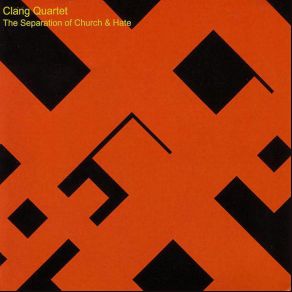The Separation of Church & Hate
Download links and information about The Separation of Church & Hate by Clang Quartet. This album was released in 2003 and it belongs to Electronica, Avant Garde Jazz, Rock, Avant Garde Metal genres. It contains 9 tracks with total duration of 48:10 minutes.

|
|
|---|---|
| Artist: | Clang Quartet |
| Release date: | 2003 |
| Genre: | Electronica, Avant Garde Jazz, Rock, Avant Garde Metal |
| Tracks: | 9 |
| Duration: | 48:10 |
| Buy it NOW at: | |
| Buy on iTunes $9.99 | |
Tracks
[Edit]| No. | Title | Length |
|---|---|---|
| 1. | Amazing Disgrace | 4:29 |
| 2. | Under God | 5:15 |
| 3. | The Infidel Within | 10:49 |
| 4. | Companions | 6:57 |
| 5. | Two or More Gathered In His Name, Pt. 2 (Matthew 18:20) | 4:23 |
| 6. | Hadephobia | 4:36 |
| 7. | The Winds & the Sea Obey Him (Matthew 8:23-27) | 5:22 |
| 8. | The Separation of Church & Hate | 6:13 |
| 9. | Disorganized Religion | 0:06 |
Details
[Edit]Scotty Irving embraces controversy, and his second solo album as the Clang Quartet is as disturbing and uncomfortable as can be. Both left-field music fans and Christians will agree. His sound constructions include drum machines, percussion (after all, he is a percussionist and most of the music is rhythmic in essence), noise generated on a self-made instrument called "the Crutch," occasional rhythm guitars, and one-finger keyboard melodies. Tracks like "Companions" and "Under God" pair harsh noise and free improvisation. The avant-garde music fan will find them interesting, especially "The Winds & the Sea Obey Him," which throws together two different performances in the left and right speakers — it sounds like a battle of the bands between two incarnations of the Nihilist Spasm Band. Elsewhere, one thinks of Monty Cantsin (megaphone industrial poet extraordinaire) jamming with Helgoland. But what strikes most about the Clang Quartet is Irving's televangelist-inspired rants. An affirmed Christian, he tackles religious issues like the rumors that the company Proctor & Gamble had ties to Satanism ("The Infidel Within"), the existence of Hell ("Hadephobia"), racism and peer pressure ("The Separation of Church & Hate"). Hearing these topics in the context of so-called experimental music is very unusual and disturbing. Again, there might be a place in avant-garde music for religion, but one is tempted to interpret Irving's speeches as satire (in the vein of Rhythm Activism) or hoax. And the way he weaves excerpts from a news feature on one of his concerts into "Two or More Gathered in HIS Name Pt. 2" pushes self-indulgence to a new limit. Be warned. ~ François Couture, Rovi